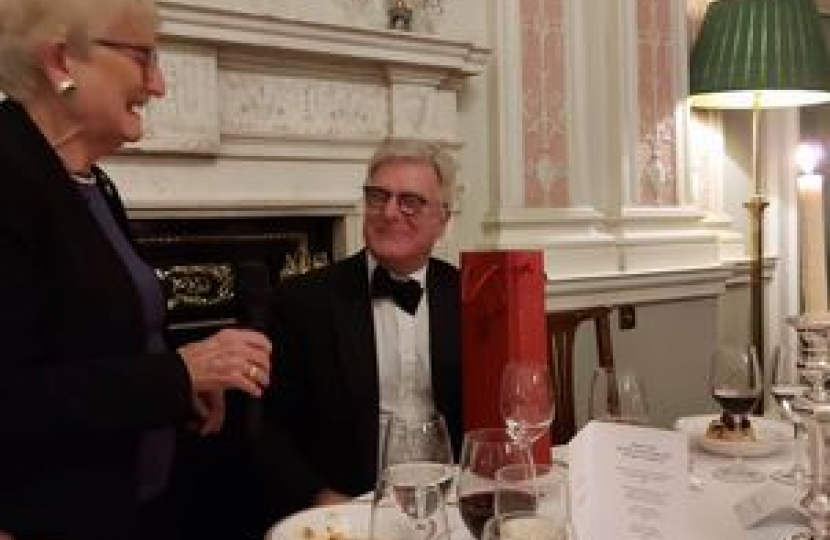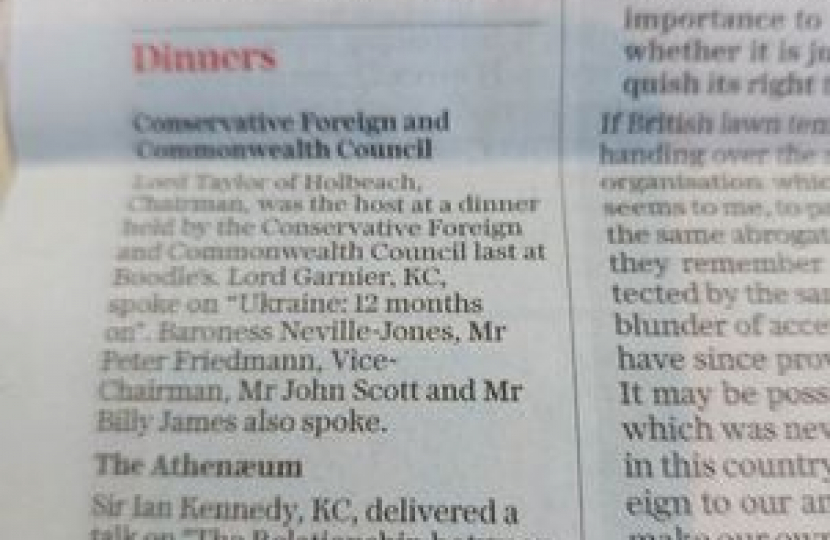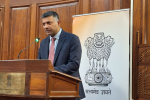Report of the event:
On a winter’s evening at esteemed club Boodle’s in early February 2023, a host of CFCC members were joined by The Rt Hon Lord Garnier KC to discuss Ukraine in anticipation of the one year anniversary of its invasion.
CFCC and Boodle’s member Billy James, who secured our esteemed guest, said the opening words, followed by CFCC Chairman the Rt Hon Lord Taylor of Holbeach, who thanked recent Boodle’s Chairman John Scott via a story about Sir Winston Churchill. The story went that former Prime Ministers Churchill and Macmillan had decided to meet for dinner at “our club” and both ended up at Boodle’s, despite neither being members.
John Scott confirmed that Churchill had become a member as a result of the story and proceeded to welcome the CFCC and Lord Garnier to Boodle’s, on behalf of the new chairman whom he thanked.
Lord Garnier said that he felt the situation in Ukraine and the consequences of Russia’s invasion were subjects that could not be avoided or underestimated. To aid the discussion he was using a few ‘Fs’.
The first set of ‘Fs’ was friends, foes and fidelity: we have discovered some new friends, discovered some old friends were not quite so friendly, and that some obvious foes were still just that.
He observed that the invasion of Ukraine which Putin may have presumed would have concluded in about a week, not only demonstrated the determination of the Ukranians but persuaded Sweden and Finland to abandon their stance of neutrality and to join NATO. He recalled that at a security conference thirty years ago a US congressman once asked of a neutral country’s delegate: “who are you neutral against?”. We now know that Sweden and Finland are, if they are neutral, neutral against Russia’s illegal and inhumane attack on Ukraine. Theirs was a “neutrality” against repression and the illegal invasion of one country against another. It demonstrated the futility of Putin’s plan if all it has done is to consolidate NATO and to add two new members.
Fidelity refers to the continuing use by some countries of Russian oil and gas . The only genuinely marketable exports Russia has are gas, oil and wood. Follow the money; see who is buying that oil and gas and who has been prepared to bear the economic burden of not doing that.
The second set of ‘Fs’ was finance and felony. There is good money and bad money. The US and other western aid now primarily directed towards military assistance amounts to £20bn plus from the USA; £2.5bn from the UK and lesser but significant sums from other NATO and western allies supplying weapons and cash. We are imposing sanctions on high level individuals in government and billionaires closely associated with Putin’s government. We were too slow in applying sanctions following the 2014 invasion of Crimea. 2104 saw the beginning of the war in eastern Ukraine and it is that war that continues today. He said that the invasion of Ukraine in 2022 had encouraged us at last to push back against those who used London for the laundry washing of dirty money. He added that there was nothing wrong with business; but it was crucial we encouraged honest business.
The third set of ‘Fs’ was firearms and firepower. Tanks, missiles, drones, training. Ukraine is engaged in a WW1 style war of attrition but with western training and better morale Ukraine is better prepared to fight more flexibly and to react speedily. It has a largely volunteer army fighting for the life of its country. Russia has the numbers but not the necessary will amongst its conscripts or the weapons where they are needed. Their tactical commanders have no discretion to exercise independent decision-making. He expressed gratitude for the Americans’ help and added that whilst the amount of weaponry and pre-deployment training the Ukranians needed would be enormous, it was something we could do if we had the will to. The current debate over the supply of heavy battle tanks had shown that a unified approach trans-Atlantically and across Europe was essential.
He recounted how his history master had explained why Russia geographically felt they were going to be invaded by Europe, but recalled that the two times they had, had been by Hitler and Napoleon and concluded that “it takes a dictator to start a war”. And when he last looked around Europe he couldn’t spot many dictators.
The final ‘F’ was the future. Wars have three stages: the initial attack by the aggressor; the second stage of arm wrestling where the warring sides grapple to gain advantage and break the other side’s will to continue; and thirdly the final end game when the defeated realises it is defeated and sues for peace. He remarked that it would be a long, not short war; an unintended consequence has been a realisation that we need bigger defence forces and a better equipped munitions sector to supply the weapons and ammunition at speed. If we have to pay a bit more tax to build bigger British armed forces, we ought to.
After a short break for a bite of Diplomat Pudding, questions were posed by CFCC members including Baroness Nicholson and Mohammed Amersi, led by the Rt Hon Baroness Neville-Jones who asked, as we ‘had a lawyer in the room’, about the kind of legal procedures there should be in the event of the Russians being held to account. Lord Garnier concluded by responding that first we had to win the war.
By Jamila Robertson
Biography:
Rt Hon Edward Garnier KC is a highly experienced silk in England & Wales and Northern Ireland. His practice includes corporate advisory and financial services work, corporate crime and international human rights as well as defamation, privacy, confidence, malicious falsehood, contempt and related media law cases. His extensive experience in practice is underpinned by a parallel career in politics and as one of the Government’s two Law Officers: he served as an MP from 1992 until 2017 and was HM Solicitor General from 2010 to 2012. He is now in the House of Lords.
Edward advises and acts for companies and individuals whose rights have been adversely affected by foreign governments and agencies, including, for example, by asset seizures, imprisonment, extradition applications and Interpol Red Notices, as well as for overseas governments and agencies who are seeking to comply with international standards and the rule of law. He is regularly consulted by NGOs and charitable organisations.
When in Government as Solicitor General, he developed and introduced into this jurisdiction from the United States the Deferred Prosecution Agreement, a means of dealing with companies who admit their offending to supplement prosecutions against individuals suspected of economic crime. He appeared for the Serious Fraud Office in two of the DPAs so far approved by the Court, the first one, Standard Bank, in 2014, and the then-largest, Rolls-Royce, in 2017.



